![]()
![]()
![]()
Use LEFT and RIGHT arrow keys to navigate between flashcards;
Use UP and DOWN arrow keys to flip the card;
H to show hint;
A reads text to speech;
39 Cards in this Set
- Front
- Back
|
Evidential Burden of Proof
|
"The requirement to establish a prima facie case. In the case of prosecutions, failure to satisfy the evidential burden will cause the judge to withdraw the case from the jury. Judge decides on evidential burden, jury on legal.
In reality, the evidential burden of proof has nothing to do with the presumption of innocence. The evidential burden of proof is the burden of proving that there is some evidence of a fact in issue. By ‘some evidence of a fact in issue’ we mean evidence on which the jury would be entitled to resolve that fact in issue in favour of the party adducing that evidence. The arbiter of law, ie, the trial judge (or, in the case of the Special Criminal Court, the trial judges), decides whether or not there is some evidence of each fact in issue, ie, whether or not each evidential burden of proof has been discharged. At the end of the prosecution’s case, the accused may make a submission of no case to answer. Such a submission essentially entails arguing that, in respect of one or more facts in issue, the prosecution has failed to adduce some evidence, on which the jury would be entitled to resolve that fact in issue in favour of the prosecution. We speak about the accused ‘raising’ a defence. In order to do so, he must discharge an evidential burden of proof. That is to say, he must satisfy the trial judge that there is some evidence of the defence, on which evidence the jury would be entitled to find in favour of the accused. Once there is some evidence of a defence – and whether that evidence is adduced by the accused or derives from the Prosecution’s case is of no moment – the defence becomes a fact in issue and there is a burden on the Prosecution to disprove / negative it. "This is not a burden merely of adducing evidence. It is legal burden discharged on the lowest standard of proof, namely that of proving a reasonable doubt." Charleton J in DPP -v- Kieran Smyth (Snr) and Kieran Smyth (Jnr) "Consequently, there must be some evidence to which the accused can point whereby a particular defence to crime becomes open. This is not a legal burden of proof; it is merely the burden of adducing sufficient evidence to allow a defence to be argued in closing and then included as part of the relevant legal directions in the charge of the trial judge ... In directing the jury on this issue, trial judges should in future, in the view of the Court, give the ordinary direction as to the burden and standard and proof and the presumption of innocence. In stating the burden and standard of proof, however, a trial judge should point out that the prosecution are obliged to prove the elements of possession of the substance, and that the substance is a controlled drug, beyond reasonable doubt. A trial judge should then tell the jury that the burden of proof shifts to the defence to prove the existence of a reasonable doubt that the accused did not know and had no reasonable ground for suspecting that what he had in his possession was a controlled drug. It should be clearly stated that this burden cast on the accused is discharged if the defence prove a reasonable doubt, and no more than that, on that issue." |
|
|
Legal Burden of Proof
|
The burden of proof "proper". The obligation to satisfy the judge or jury in relation to a particular fact. Must satisfy standard of proof, otherwise will lose the case.
Charleton J in DPP -v- Kieran Smyth (Jnr) and Kieran Smyth (Snr): "A legal burden of proof is different. This places upon the party bearing that legal burden, the obligation to prove the issue that he is required to prove. The standard of proof may vary. As already, mentioned, policy reasons have dictated that the defences of insanity and diminished responsibility should be clearly proven by the accused. For these defences, the burden of proof is for the accused to show that he has discharged the burden of proof by showing, as a probability, that he acted within the terms of one or other of those defences. The defence of insanity, as with other defences, is not, however, part of the elements of proof borne by the prosecution in establishing the crime. It is not incumbent on the prosecution to prove that in killing the deceased that the accused was not insane. It is for the accused to raise that defence and to prove it." |
|

Woolmington -v- DPP
|

Golden thread. Wife left, accused shot her, claimed it was accidental, threatening suicide. One witness heard shot and saw him leave. Trial judge directed jury that once satisfied Accused had killed wife, they should convict unless he proved otherwise. Overruled by HoL - onus is always on the prosecution to prove guilt, rather than the Accused to prove innocence
|
|

People (AG) -v- MacMahon
|

Approved Woolmington in Ireland. Maguire P: "the court is of the opinion that this principle is the true one, and, as applicable to the facts of this case, imposes on the prosecution the necessity of negativing every supposition consistent with the innocence of the accused".
|
|

Golden Thread
|

Sankey LJ in Woolmington -v- DPP: "Throughout the web of the English Criminal Law, one golden thread is always to be seen, that it is the duty of the prosecution to prove the prisoner's guilt, subject to what I have already said as to the defence of insanity and subject also to any statutory exception ... No matter what the carge or where the trial, the principle that the prosecution must prove the guilt of the prisoner is part of the common law of England, and no attempt to whittle it down can be entertained."
|
|
|
Insanity
|
Every accused is considered sane, until proven otherwise, on the balance of probabilities.
Charleton J in DPP -v- Kieran Smyth (Jnr) and Kieran Smyth (Snr): . The re-statement of the law in s. 4 of the Criminal Law (Insanity) Act, 2006 as to insanity, and the introduction of the defence of diminished responsibility in s. 6 of that Act, carries with it a burden of proof on the defence which is discharged on the balance of probabilities. The prosecution carry the entire burden of proving the commission of the crime. Sound reasons of policy may indicate that a defence should be proven by the accused as a probability. One reason arises in relation to the special defence of insanity. A person who is found to have committed an intentional killing, for instance, and who might make out a plea of insanity on the basis of merely raising a reasonable doubt would, if not insane, be in danger of being discharged almost immediately by the Central Mental Hospital. A decision to reverse on to the accused an element of the proof of the commission of a crime that might normally be expected to be borne by the prosecution, or to set up a special defence such as insanity, is a matter of legislative competence. It is for the Oireachtas, in each case, to set the parameters of proof in a criminal charge; to decide whether there should be a reversed burden of proof in respect of any element of a crime; and to indicate expressly, or by implication, the nature of the burden of proof that is to be discharged by the defence ... |
|
|
R -v- M'Naughten
|
HoL established that the legal burden of proof rests upon the accused, on the balance of probabilities.
|
|

AG -v- Boylan
|

Approved M'Naughten in Ireland, legal burden of proof rests upon the accused to prove insanity, on the balance of probabilities
|
|
|
Burden of Proof - Statutory Exceptions
|
Certain instances, such as Section 3(2) of the Offences Against the State Act, 1972 where inferrences of terrorist activity drawn from from possession of documents shift the evidential burden of proof to the accused, but only the evidential burden.
|
|
|
Section 3(2) Offences Against the State (Amendment) Act 1972
|
Opinion Evidence. O'Leary -v- AG
(2) Where an officer of the Garda Síochána, not below the rank of Chief Superintendent, in giving evidence in proceedings relating to an offence under the said section 21, states that he believes that the accused was at a material time a member of an unlawful organisation, the statement shall be evidence that he was then such a member. |
|
|
Section 12 Offences Against the State Act 1939
|
Possession of Incriminating Documents. O'Leary -v- AG
12.—(1) It shall not be lawful for any person to have any treasonable document, seditious document, or incriminating document in his possession or on any lands or premises owned or occupied by him or under his control. (2) Every person who has a treasonable document, seditious document, or incriminating document in his possession or on any lands or premises owned or occupied by him or under his control shall be guilty of an offence under this sub-section and shall be liable on summary conviction thereof to a fine not exceeding fifty pounds or, at the discretion of the Court, to imprisonment for a term not exceeding three months or to both such fine and such imprisonment. (3) Where a person is charged with an offence under this section, it shall be a good defence to such charge for such person to prove— (a) that he is an officer of the State and had possession or custody of the document in respect of which the offence is alleged to have been committed in the course of his duties as such officer, or (b) that he did not know that the said document was in his possession or on any lands or premises owned or occupied by him or under his control, or (c) that he did not know the nature or contents of the said document. |
|
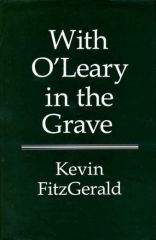
O'Leary -v- AG
|

Opinion evidence, posession of incriminating documents under Offences Against the State Act 1939 and 1972. Court found shifting of burden to be evidential only, and constitutional.
Opinion evidence only operated to allow evidence that would otherwise be hearsay. Documents to be considered and inferences drawn, not proof in themselves, not necessary for the accused to give evidence to prove innocence in all instances. Costello J considered the constitutional status of the presumption of innocence (in the context of the guarantee of a trial in due course of law pursuant to Article 38 of the Constitution), by reference to Article 6(2) of the ECHR, Article 11 of the UN Universal Declaration on Human Rights 1948. He stated that he was entitled to construe the Constitution “in the light of contemporary concepts of fundamental rights”. "On the trial of a person charged with the offence of being a member of an unlawful organisation, proof to the satisfaction of the court that an incriminating document7 relating to the said organisation was found … in his possession … shall, without more, be evidence, until the contrary is proved, that such a person was a member of the said organisation at the time alleged in the said charge. (Footnote added. Emphasis added.)" O’ Leary was convicted of membership of an unlawful organisation (‘the offence’), having been found in possession of incriminating documents, namely, posters, according to which, ‘IRA calls the shots’. In these proceedings, he argued that s. 24 violated his right to a trial in due course of law in that it required him to prove his innocence, ie, to prove that he was not a member of an unlawful organisation. O’ Flaherty J, for the Supreme Court, held that s. 24 did not violate Article 38.1. S. 24 enacts that the accused’s possession of an incriminating document is evidence, not proof, of his guilt of the offence. All that s. 24 does is to require an accused person to prove that such possession is not evidence of such guilt. As O’ Flaherty J explained: [T]he probative value of the possession of [an incriminating] document might be shaken in many ways: by cross-examination; by pointing to the mental capacity of the accused or the circumstances by which he came to be in possession of the document, to give some examples ... For example, if the accused could prove that he took possession of incriminating documents under duress, such possession would not be evidence that he was a member of an unlawful organisation. O’ Flaherty J concluded, ‘[t]he important thing to note about the section is that there is no mention of the burden of proof changing, much less that the presumption of innocence is to be set to one side at any stage.’ |
|
|
Section 4(1) of the Explosive Substances Act 1883
|
Possession of Explosives. Hardy -v- Ireland.
4 (1)Any person who makes or knowingly has in his possession or under his control any explosive substance, under such circumstances as to give rise to a reasonable suspicion that he is not making it or does not have it in his possession or under his control for a lawful object, shall, unless he can show that he made it or had it in his possession or under his control for a lawful object, be guilty of felony, and, on conviction, shall be liable to penal servitude for a term not exceeding fourteen years, or to imprisonment for a term not exceeding two years . . . F1, and the explosive substance shall be forfeited. (2)In any proceeding against any person for a crime under this section, such person and his wife, or husband, as the case may be, may, if such person thinks fit, be called, sworn, examined, and cross-examined as an ordinary witness in the case. |
|
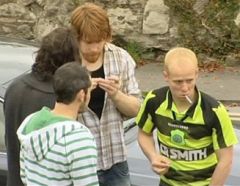
Hardy -v- Ireland
|

Possession of explosives. First, prosecution must establish beyond reasonable doubt circumstances of reasonable suspicion that Accused did not have explosives for a lawful object. Legal burden remains on the prosecution, evidential burden on accused if the foregoing is satisfied to show lawful object. Murphy J pointed out that it is very difficult to prosecute these types of offences.
Hederman J analysed s. 4(1) and said: In my judgement, in a trial alleging an offence under the section the prosecution has to prove beyond reasonable doubt … (1) that the accused knowingly had in his possession a substance, which it proves is an explosive substance; (2) that he had it under such circumstances as to give rise to a reasonable suspicion that he did not have it in his possession for a lawful object and that, in turn, means that there is an onus on the prosecution to prove that the accused could not show that he had it in his possession for a lawful object .… Once these ingredients are in place, it is still open to the accused to demonstrate in any one of a number of ways, such as by cross-examination, submissions or by giving evidence, that a prima facie situation pointing to his guilt should not be allowed to prevail …. What is kept in place … is the essential requirement that, at the end of the trial and before a verdict can be entered the prosecution must show that it has proved its case beyond all reasonable doubt. (Emphasis added.) Murphy J agreed, saying that he could see no ‘inconsistency between a trial in due course of law ... and a statutory provision such as [s. 4(1)], which affords to an accused a particular defence of which he can avail if, but only if, he proves that material facts on the balance of probabilit[y].’ |
|
|
Peculiar Knowledge Principle
|
Historical exception to Woolmington legal burden shifts where fact is peculiarly within the knowledge of the defendant. Doubtful force today.
Minister of Industry & Commerce -v- Steele, McGowan -v- Carville, AG -v- Shorten, R -v- Edwards |
|

Minister of Industry & Commerce -v- Steele
|

Peculiar knowlege principle. Pork sausages, requirement of 65% pork, analysis not possible, minister failed to discharge burden at trial, S.C. held that burden had shifted, would be impossible to prosecute otherwise.
|
|

McGowan -v- Carville
|
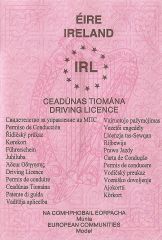
Peculiar knowlege principle. Accused claimed to have presented driving license at a Garda station following a stop. Garda failed to discharge burden at trial, on appeal Davitt P reluctantly found that burden had shifted - burden limited to facts "exclusively" or "almost exclusively" within knowledge of Accused
Murnaghan J said, ‘... there is no onus on a person charged with an offence to prove his innocence, the onus at all times being on the State to prove his guilt.’ Indeed, any law that purported to require an accused person to prove his innocence would be repugnant to Article 38.1 of the Constitution. |
|

AG -v- Shorten
|

Peculiar knowlege principle. Accused made statement that car had not been used for four months, gardaí claimed to have seen his car on the road, could not identify driver. Court refused to shift burden - could have been family member or other that took car, outside Accused's knowledge. Court showed reluctance to resort to principle.
|
|

R -v- Edwards
|

Peculiar knowledge principle. Court of Appeal pointed out that intent is peculiarly within knowledge of Accused, so the principle could be used to prove their innocence, if taken to its logical conclusion.
|
|
|
Burden of proof - Civil Cases
|
Presumption of innocence does not apply, general rule that the party who asserts a fact must prove it.
|
|
|
Res ipsa loquitur
|
The acts speak for themselves. In effect shifts burden to defendants.
Scott v London and St. Katherine Docks Company: "Where the thing is shown to be under the management of the defendant or his servants, and the accident is such as in the ordinary course of things does not happen if those who have the management use proper care, it affords reasonable evidence, in the absence of the defendants, that the accident arose from want of care." Byrne v. Boadle, Mullen -v- Quinnsworth, Lindsay (A Minor) -v- Mid-Western Health Board, Hanrahan -v- Merck, Sharp and Dohme Ltd., Rothwell -v- MIBI DPP -v- PJ Carey Contracting Ltd. |
|

Scott v London and St. Katherine Docks Company
|

Res ipsa loquitur. Bags of sugar fell on customs officer at the docks.
"Where the thing is shown to be under the management of the defendant or his servants, and the accident is such as in the ordinary course of things does not happen if those who have the management use proper care, it affords reasonable evidence, in the absence of the defendants, that the accident arose from want of care." |
|

Mullen -v- Quinnsworth
|

Elderly plaintiff slipped on vegetable oil, burden shifted to Quinnsworth to show that they were not negligent.
|
|

Lindsay -v- Mid Western Health Board
|

Appendix removed, plaintiff never recovered consciousness, suffered brain damage. S.C. Held that the onus is on the Defendant to show that they exercised all reasonable care, but did not have to prove what in fact did cause the plaintiff's brain injury.
"...the maxim was not a special rule of substantive law, but was no more than the application of "the general method of inferring one or more facts in issue from circumstances proved in evidence", "… For the reasons I have suggested as regards how unique and unusual this occurrence was, and because of the respective positions of the litigants, clearly an answer was required from the defendant. That answer could be provided in two ways. It could have proved, on the balance of probabilities, that the plaintiff met her injuries in a particular manner that caused her condition but which was not connected to the administration of the anaesthetic. This it failed to do. The furthest the defendant got was to suggest as possibilities other means by which the plaintiff sustained her injuries. I believe this evidence is not, however, to be regarded as totally inadmissible. It was legitimate, I believe, for the defendant to adduce evidence of possibilities, remote though they might be, as explanations; in contradistinction to saying that it could not offer any explanation of any description whatsoever. It went to provide some corroboration, as well, that there was no negligence on its part in the administration of the anaesthetic. The other course was for the defendant to establish that from beginning to end of this anaesthetic procedure there was no negligence on its part. This it did decisively and, in those circumstances, it appears to me that it rebutted the burden of proof that rested on it to displace the maxim res ipsa loquitur and so the case returned to the plaintiff's bailiwick to prove negligence ... I believe that it is necessary to ensure that the rule embodied in the maxim does not put a burden on defendants which is so onerous as to produce an unjust result. Each case must, of course, be dealt with in accordance with its own particular facts but, as I have said, I believe that in the circumstances here the defendant has met the prima facie case made against it as fully as could be expected. It would be an unjustifiable extension of the law to say that in the absence of an explanation that could be proved, on the balance of probabilities, negligence on the part of the defendant must be inferred. It has often been said that medical science is not an exact one and it is safe to prophesy that medical science and its technology will advance past frontiers which are not within anyone's contemplation at this time and so matters at present not amenable to explanation will be capable of resolution." |
|
|
Hanrahan -v- Merck, Sharp and Dohme Ltd.
|
Nuisance, Rylands -v- Fletcher, court refused to shift the onus,
Henchy J "The rationale behind the shifting of the onus of proof to the defendant in such cases would appear to lie in the fact that it would be palpably unfair to require a plaintiff to prove something which is beyond his reach and which is peculiarly within the range of the defendant's capacity of proof" "The ordinary rule is that a person who alleges a particular tort must in order to succeed prove…. all the necessary ingredients of that tort and it is not for the defendant's to disprove anything. Such exceptions as have been allowed that general rule seem to be confined to cases where a particular element of the tort lies or is deemed to lie pre-eminently within the defendants knowledge in which case the onus of proof as to that matter passes to the defendant. Thus, in the tort of negligence, where damage has been caused to the plaintiff in circumstances in which such damage would not usually be caused without negligence on the part of the defendant, the rule of res ipsa loquitur will allow the act relied on to be evidence of negligence in the absence of proof by the defendant that it has occurred without want of due care on his part. The rationale behind the shifting of the onus of proof to the defendant in such cases would appear to rely on the fact that it would be palpably unfair to require a plaintiff to prove something which is beyond his reach and which is peculiarly within the range of the defendant's capacity of proof". "There are of course difficulties facing the plaintiffs in regard to proof of [certain] matters particularly as to the question of causation, but mere difficulty of proof does not call for a shifting of the onus of proof… The onus of disproof rests on the defendant only when the Act or default complained of is such that it would be fundamentally unjust to require the plaintiff to prove a positive averment when the particular circumstances show that fairness and justice call for disproof by the defendant". |
|

Rothwell -v- MIBI
|

Oil spillage on the road, Plaintiff lost control and struck an oncoming vehicle. Could not be established who left it there.
"It appears to me that the judgment in Hanrahan, requires not merely that a matter in respect of which the onus is to shift is within the exclusive knowledge of the defendant, but also that it is " peculiarly within the range of the defendant's capacity of proof". That is not the position here. As the learned trial judge clearly and succinctly held, neither party could go further: the matter was not within the knowledge, exclusive or otherwise, of either of them ... Where proof of some proposition is insufficient, that will enure to the disadvantage of the party on whom the onus of proof lies. In my view, this is the plaintiff. There is simply a failure of proof, unremedied by any presumption or shifting of the onus of proof." |
|

Byrne v. Boadle
|

Old authority, barrell fell from shop, Pollock C.B. said that
"There are certain cases of which it may be said res ipsa loquitur and this seems to be one of them ... The learned counsel was quite right in saying that there are many accidents from which no presumption of negligence can arise, but I think it would be wrong to lay down as a rule that in no case can a presumption of negligence arise from the fact of an accident". |
|

DPP -v- PJ Carey (Contractors) Limited [2011]
|

Pipe layers, trench collapsed, prosecution under Health and Safety Act, failure to provide safe system of work, Prosecution sought to rely on res ipsa loquitur,
“In response to this, insofar as it concerns the second count, the prosecution relied on res ipsa loquitur or, as the Judge said, “the facts speak for themselves”. I do not think that this clichéd phrase is remotely adequate to carry a serious criminal prosecution past an application for a direction.” |
|
|
Section 50 of the Safety Health and Welfare at Work Act, 1989
|
DPP -v- PJ Carey Contractors
“In any proceedings for an offence under any of the relevant statutory provisions consisting of a failure to comply with a duty or requirement to do something so far as is practicable or so far as is reasonably practicable, or to use the best practicable means to do something, it shall be for the accused to prove (as the case may be) that it was not practicable or reasonably practicable to do more than was in fact done to satisfy the duty or requirement, or that there was no better practicable means than was in fact used to satisfy the duty or requirement”. Annotation: Section 50 creates a reversed evidential burden of proof, but the onus is on the Prosecution to establish a prima facie case that the system of work is unsafe, before the section comes in to play. Prima facie case not established in this instance. Commentary: “This corresponds to s.40 of the United Kingdom Health and Safety at Work Act, 1974, and it provides for a shift in the evidential burden on a defendant in circumstances where the defendant is charged with an offence where he is under a duty to do something as far as is practicable or reasonably practicable or to use the best practicable means to do something. Barrington considered this point at pp 129-130. Recommending that s.40 of the [English] Act be used as a model, it stated that the prosecution should be obliged to establish first a prima facie case that, for example, a system was unsafe. Then s.50 should come into operation, obliging the defendant to establish that in relation to the system in place it was not reasonably practicable to have done more. Barrington argued that this shift in the evidential burden was justified by the fact that the internal organisation of a place of work is ‘peculiarly within the employer’s province’. Thus, while s.50 appears to displace the normal burden in a criminal trial, it may well not fall foul of Article 38.1 of the Constitution by virtue of being confined to the evidential burden rather than the burden of proof…” |
|

D.P.P.-v- Kieran Smyth (Snr) & Kieran Smyth (Jnr)
|

Parcels of cannabis seized by DHL, passed to gardaí, who contacted plaintiffs to collect, which they did and were charged with possession under Section 15 of the Misuse of Drugs Act. CCA, Charleton J:
"In criminal proceedings the burden of proving the charge is on the prosecution and that burden must be discharged by proof beyond reasonable doubt. Where any element of proof is reversed, it is not the law that the accused bears the burden of proving the non-existence of the relevant element of the offence beyond reasonable doubt. The Court is satisfied that it was not the intention of the learned trial judge to so indicate to the jury trying the applicants. In the result, however, a real issue has arisen as to whether that occurred in his charge to the jury." " A burden of proof on the accused, as set out in s. 29 of the Misuse of Drugs Act 1977, as amended, is not unique as to its form in criminal statutes. In making these comments, however, the Court confines itself to that specific provision. It is not, for instance, making any wider declaration as to how any particular reversed burden of proof is to be approached. In particular, it makes no comment on the historical feature of the insanity defence whereby it has always been the law that those who plead the defence must prove clearly that they did not know the nature and quality of their act, or that they did not know that what they were doing was morally wrong or that they could not control their actions. The re-statement of the law in s. 4 of the Criminal Law (Insanity) Act, 2006 as to insanity, and the introduction of the defence of diminished responsibility in s. 6 of that Act, carries with it a burden of proof on the defence which is discharged on the balance of probabilities. The prosecution carry the entire burden of proving the commission of the crime. Sound reasons of policy may indicate that a defence should be proven by the accused as a probability. One reason arises in relation to the special defence of insanity. A person who is found to have committed an intentional killing, for instance, and who might make out a plea of insanity on the basis of merely raising a reasonable doubt would, if not insane, be in danger of being discharged almost immediately by the Central Mental Hospital. A decision to reverse on to the accused an element of the proof of the commission of a crime that might normally be expected to be borne by the prosecution, or to set up a special defence such as insanity, is a matter of legislative competence. It is for the Oireachtas, in each case, to set the parameters of proof in a criminal charge; to decide whether there should be a reversed burden of proof in respect of any element of a crime; and to indicate expressly, or by implication, the nature of the burden of proof that is to be discharged by the defence ... How the burden of proof is borne depends upon the substantive law. At a criminal trial, the burden of proof is borne by the prosecution in respect of every issue; except on those issues on which the burden of proof is cast on the accused by statute... Consequently, there must be some evidence to which the accused can point whereby a particular defence to crime becomes open. This is not a legal burden of proof; it is merely the burden of adducing sufficient evidence to allow a defence to be argued in closing and then included as part of the relevant legal directions in the charge of the trial judge ... It should be clearly stated that this burden cast on the accused is discharged if the defence prove a reasonable doubt, and no more than that, on that issue. |
|
|
Section 29(2) of the Misuse of Drugs Act, 1977
|
DPP -v- Kieran Smyth (Snr) and Kieran Smyth (Jnr)
“In any such proceedings in which it is proved that the defendant had in his possession a controlled drug… it shall be a defence to prove that:- he did not know and had no reasonable grounds for suspecting – that what he had in his possession was a controlled drug… or that he was in possession of a controlled drug.” |
|
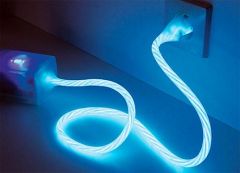
DPP -v- Power [2007]
|

Section 15A - mens rea as to the value of the drugs is for proof, accordingly no burden for the prosecution to show that the accused knew, or ought to have known that drugs worth €13,000 or more.
|
|
|
Section 4 of the Criminal Law (Insanity) Act 2006
|
4.— (1) Where in the course of criminal proceedings against an accused person the question arises, at the instance of the defence, the prosecution or the court, as to whether or not the person is fit to be tried the following provisions shall have effect.
(2) An accused person shall be deemed unfit to be tried if he or she is unable by reason of mental disorder to understand the nature or course of the proceedings so as to— (a) plead to the charge, (b) instruct a legal representative, (c) in the case of an indictable offence which may be tried summarily, elect for a trial by jury, (d) make a proper defence, (e) in the case of a trial by jury, challenge a juror to whom he or she might wish to object, or (f) understand the evidence. (3) (a) Where an accused person is before the District Court (in this section referred to as “the Court”) charged with a summary offence, or with an indictable offence which is being or is to be tried summarily, any question as to whether or not the accused is fit to be tried shall be determined by the Court. (b) Subject to subsections (7) and (8), in a case to which paragraph (a) relates, the Court determines that an accused person is unfit to be tried, that Court shall adjourn the proceedings until further order, and may— (i) if it is satisfied, having considered the evidence of an approved medical officer adduced pursuant to subsection (6) and any other evidence that may be adduced before it that the accused person is suffering from a mental disorder (within the meaning of the Act of 2001) and is in need of in-patient care or treatment in a designated centre, commit him or her to a specified designated centre until an order is made under section 13 , or (ii) if it is satisfied, having considered the evidence of an approved medical officer adduced pursuant to subsection (6) and any other evidence that may be adduced before it that the accused person is suffering from a mental disorder or from a mental disorder (within the meaning of the Act of 2001) and is in need of out-patient care or treatment in a designated centre, make such order as it thinks proper in relation to the accused person for out-patient treatment in a designated centre. (c) Where in a case to which paragraph (a) relates, the Court determines that the accused person is fit to be tried the proceedings shall continue. (4) (a) Where an accused person is before the Court charged with an offence other than an offence to which paragraph (a) of subsection (3) applies, any question as to whether that person is fit to be tried shall be determined by the court of trial to which the person would have been sent forward if he or she were fit to be tried and the Court shall send the person forward to that court for the purpose of determining that issue. (b) Where an accused person is sent forward to the court of trial under paragraph (a), the question of whether the person is fit to be tried shall be determined by the judge concerned sitting alone. (c) If the determination under paragraph (b) is that the accused person is fit to be tried, the provisions of the Criminal Procedure Act 1967 , shall apply as if an order returning the person for trial had been made by the Court under section 4A of that Act (inserted by section 9 of the Criminal Justice Act 1999 ) on the date the determination was made but, in any case where section 13 of that Act applies, the person shall be returned for trial. (d) If the determination under paragraph (b) is that the person is unfit to be tried the provisions of subsection (5) shall apply. (e) Where the court subsequently determines that the person is fit to be tried the provisions of the Criminal Procedure Act 1967 , shall apply as if an order returning the person for trial had been made by the Court on the date the determination was made. (5) (a) Where an accused person is before a court other than the Court charged with an offence and the question arises as to whether that person is fit to be tried the provisions of this subsection shall apply. (b) The question of whether the accused person is fit to be tried shall be determined by the judge concerned sitting alone. (c) Subject to subsections (7) and (8), if the judge determines that the accused person is unfit to be tried, he or she shall adjourn the proceedings until further order, and may— (i) if he or she is satisfied, having considered the evidence of an approved medical officer adduced pursuant to subsection (6) and any other evidence that may be adduced before him or her that the accused person is suffering from a mental disorder (within the meaning of the Act of 2001) and is in need of in-patient care or treatment in a designated centre, commit him or her to a specified designated centre until an order is made under section 13 , or (ii) if he or she is satisfied, having considered the evidence of an approved medical officer adduced pursuant to subsection (6) and any other evidence that may be adduced before him or her that the accused person is suffering from a mental disorder or from a mental disorder (within the meaning of the Act of 2001) and is in need of out-patient care or treatment in a designated centre, make such order as he or she thinks proper in relation to the accused person for out-patient treatment in a designated centre. (d) Where the court determines that the accused person is fit to be tried the proceedings shall continue. (6) (a) For the purposes of determining whether or not to exercise a power under subsection (3) or (5) the court— (i) for that purpose, may commit him or her to a designated centre for a period of not more than 14 days, and (ii) shall direct that the accused person concerned be examined by an approved medical officer at that centre. (b) Within the period of committal authorised by the court under this subsection, the approved medical officer concerned shall report to the court on whether in his or her opinion the accused person committed under paragraph (a) is— (i) suffering from a mental disorder (within the meaning of the Act of 2001) and is in need of in-patient care or treatment in a designated centre, or (ii) suffering from a mental disorder or from a mental disorder (within the meaning of the Act of 2001) and is in need of out-patient care or treatment in a designated centre. (7) Where on the trial of an accused person the question arises as to whether or not the person is fit to be tried and the court considers that it is expedient and in the interests of the accused so to do, it may defer consideration of the question until any time before the opening of the case for the defence and if, before the question falls to be determined, the jury by the direction of the court or the court, as the case may be, return a verdict in favour of the accused or find the accused person not guilty, as the case may be, on the count or each of the counts on which the accused is being tried the question shall not be determined and the person shall be acquitted. (8) Upon a determination having been made by the court that an accused person is unfit to be tried it may on application to it in that behalf allow evidence to be adduced before it as to whether or not the accused person did the act alleged and if the court is satisfied that there is a reasonable doubt as to whether the accused did the act alleged, it shall order the accused to be discharged. (9) Where evidence is adduced before the court under subsection (8) but the court decides not to order the accused person to be discharged, no person shall publish a report of the evidence or the decision until such time, if any, as— (a) the trial of the person concludes, or (b) a decision is made not to proceed with the trial of the person or the trial is otherwise not proceeded with. (10) A person who contravenes subsection (9) shall be guilty of an offence and shall be liable on summary conviction to a fine not exceeding €3,000 or to imprisonment for a term not exceeding 12 months or to both. |
|
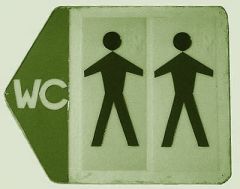
DPP -v- WB
|

Insanity, Accused of sexual assault of security guard, armed with a knife, long hair, finding of not guilty by reason of insanity, Sheehan J in the Central Criminal Court Section 5 (2) provides that, having considered the report and any other evidence and being satisfied that the person has a mental disorder within the meaning of the Mental Health Act 2001, the Court shall commit the person to a centre until an order is made under section 13. Section 5 (2) of the Act of 2006 operates to detain the individual in the Central Mental Hospital until an order is made under s.13 of the Act of 2006.
|
|
|
State (Healy) v. Donoghue [1976] IR 325
|
Article 38.1 of the Constitution enshrines the right to a trial in due course of law. This right has various manifestations. In State (Healy) v. Donoghue [1976] IR 325, O’ Higgins CJ observed:
… it is clear that the words ‘due course of law’ in Article 38 make it mandatory that every criminal trial shall be conducted in accordance with concepts of justice, that the procedures applied shall be fair, and that the person accused will be afforded every opportunity to defend himself. If this were not so, the dignity of the individual would be ignored and the State would have failed to vindicate his personal rights. The right to a trial in due course of law dictates, inter alia, that the accused is presumed innocent until proved guilty. This is the presumption of innocence. The presumption of innocence exists at Common Law. By virtue of Article 38.1 of the Constitution, it enjoys constitutional status in Ireland. |
|
|
Article 38.1 of the Constitution
|
State (Healy) -v- Donoghue
Article 38 of the Constitution provides: 1. No person shall be tried on any criminal charge save in due course of law 2. Minor offences may be tried by courts of summary jurisdiction 3. Save in the case of trial of offences under section 2 no person shall be tried on any criminal charge without a jury |
|

The People (DPP) v. D O’ T [2003] 4 IR 286
|
The rule that, generally speaking, the prosecution bears the burden of proving all the elements of the offence necessary to establish guilt is a corollary of the presumption. To state the incidence of the burden of proof without indicating its basis in the presumption is to risk understating its importance and perhaps relegating it to the status of a mere technical rule. The presumption is the basis of the rule as to the burden of proof and not merely an alternative way of stating it. ... It is therefore, important that the presumption itself should be explained as an essential feature of the criminal trial. The prosecution’s burden of proof, the corollary of the presumption, should be itself separately explained. There must then be a treatment of the standard of proof, which is proof beyond reasonable doubt, and which itself entails the corollary that the defendant is entitled to the benefit of any reasonable doubt.
The importance of explaining the presumption of innocence to the jury was central to the decision in People (DPP) v DO’T. The Court observed that: "[t]he presumption of innocence … is not only a right in itself: it is the basis of other aspects of a trial in due course of law at common law. The rule that, generally speaking, the prosecution bears the burden of proving all the elements of the offence necessary to establish guilt is a corollary of the presumption. To state the incidence of the burden of proof without indicating its basis in the presumption is to risk understating its importance and perhaps relegating it to the status of a mere technical rule. The presumption is the basis of the rule as to the burden of proof and not merely an alternative way of stating it. The presumption also exists, and has effect, in ways other than simply dictating the incidence of the burden of proof at the trial. In the Court’s view, the presumption should be explained to the jury and the charge should include: “…a statement that the presumption is that every accused person is innocent until a jury is satisfied to the contrary to the appropriate standard and that this presumption is the basic, constitutionally guaranteed, condition of a trial in due course of law [followed by] … instruction as to the onus of proof, described as a consequence of that presumption to which every accused is entitled.” The Court held that a recharge (the trial judge having omitted to mention the presumption in the original charge) in which the presumption was “no more than mentioned without being explained and which omitted to elaborate on the relationship between the presumption and the rules of evidence the jury was being asked to apply, was inadequate. It was also held to be erroneous to suggest that the onus of proof lay with the prosecution where there was a “difference” between the parties. Such a statement could be taken to suggest that the burden on the prosecution is limited or that the accused was expected to establish such a difference before the prosecution was called on to prove its case. |
|
|
The People (DPP) v. Kelly [2000]
|
‘the onus on the prosecution is not only to prove its case ... but also to negative ... any defence raised by the accused.’
|
|

The People (DPP) v. Barnes [2007] 3 IR 130.
|

Does the burden of proving any of the other defences rest on the accused?
Suppose that X enters Y’s house as a trespasser intending to steal. Y arrives home unexpectedly. He comes upon X in his house. He attacks X. In self-defence, X employs fatal force against Y. Now X stands charged with murder or manslaughter. He raises the defence of self-defence. Where the defence of self-defence is raised, whether or not the force used by the accused in self-defence was necessary becomes a fact in issue. Currently, there is no burden on the accused to prove that the force he used in self-defence was necessary. Rather, the prosecution must prove that the force used by the accused in self-defence was not necessary. However, in the scenario outlined, the fact in issue, ie, whether or not the force used by X in self-defence was necessary, is a fact that lies peculiarly within X’s knowledge. He is the only person who knows what really happened. Does the ‘peculiar-knowledge doctrine’4 operate to require X to prove the fact in issue? This matter was considered recently by the Court of Criminal Appeal in The People (DPP) v. Barnes5. For the court, Hardiman J said obiter: It may be that, if another case of this sort presents itself, it would be possible to argue that the rights of the householder to his life and to the inviolability of his dwelling are inadequately protected by a rule which fails to differentiate, in addressing the onus of proof, between a fight in a public place [to which there would probably be many witnesses] and the position of a burglar who kills a householder in the house which he is burgling [to which killing there would probably be only two witnesses, one of whom is now dead]. It may be that, in so doing, the burglar has placed himself in the position where he has exclusive knowledge6 of the cause of the householder’s death. If this is so then the burden of proof might be regarded as devolving upon the burglar to establish self defence. … But the point does not arise in the circumstances of the present case. (Emphasis added. Footnote added.) These dicta require us to be alert to the possibility of the courts using constitutional rights to shift the burden of proving a defence onto the accused. |

